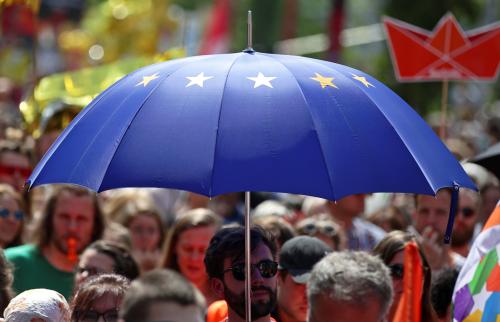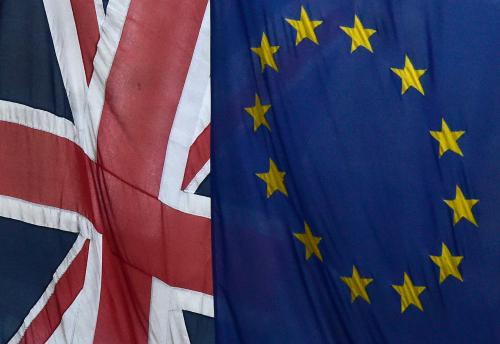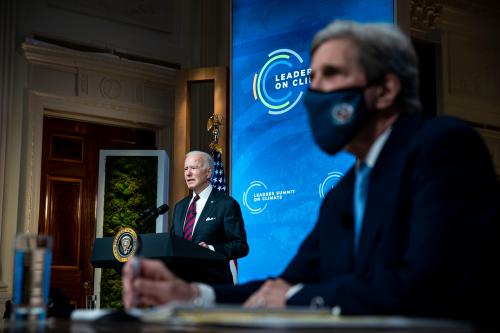This op-ed was originally published by Project Syndicate.
After several anxiety-filled rollercoaster days following the recent U.S. presidential election, it is now all but certain that Joe Biden will become America’s next president on January 20, 2021. Whether Democrats also take control of the Senate depends on the outcome of two crucial runoff votes in Georgia on January 5. The more erratic and outrageous President Donald Trump’s behavior is in the coming weeks, the greater the chances of the Democrats flipping those seats.
But whatever happens in Georgia, Europe and much of the world have breathed a sigh of relief at Biden’s victory. The dominant global narrative in recent years has been the inexorable retreat of multilateralism and the rise of dangerous forms of great-power rivalry, even as huge challenges such as climate change, possible new pandemics, cyberattacks, and the misuse of new technologies require a coordinated global response. But this mismatch isn’t inevitable. Biden’s triumph at least creates the possibility of much greater international cooperation to confront these threats—and Europe needs to play a prominent role.
The European Union’s High Representative for Foreign Affairs and Security Policy, Josep Borrell, has previously outlined the bloc’s global strategy. It involves increasing Europe’s geostrategic cohesion and strategic autonomy, while reaching out to others and supporting universal principles, plurilaterally if necessary and multilaterally whenever possible. These two pillars are complementary but also reinforcing. A more cohesive and strategically autonomous EU can be more effective in seeking multilateral solutions, while a more cooperative world order would help to boost the bloc’s influence and vindicate its raison d’être.
A key question now is how Europe can work with the Biden administration to advance such cooperation by example, through initiatives that would crowd in support for multilateralism in the United States and elsewhere. Several possibilities stand out.
For starters, the COVID-19 pandemic is still raging on both sides of the Atlantic, and threatens the economic recovery. Notwithstanding recent encouraging news on the vaccine front, supporting the global economy will remain an immediate priority, together with making vaccines available worldwide.
To raise more resources on a global scale, the EU could propose a new $500 billion issuance of Special Drawing Rights (the International Monetary Fund’s global reserve asset) with the provision that rich countries make a portion of their new SDRs available to less developed countries, as Joseph Stiglitz and others have long argued. This would help the poorest countries while increasing the IMF’s overall lending capacity, notably to emerging-market economies hit hard by the crisis. Preventing an emerging-market debt crisis is important for the overall global recovery, including for more robust growth in the U.S. and Europe.
Although a new issuance of SDRs may receive some bipartisan U.S. support, the Biden administration could vote for it at the IMF in its first 100 days without explicit Senate consent. Such an early win for transatlantic cooperation could then open the door to other initiatives.
Moreover, such a proposal could be accompanied by France and Germany giving up one percentage point of their combined IMF quota of 9.84 percent and agreeing to a single joint executive director on the boards of the Fund and the World Bank, without waiting for the protracted negotiations on quota reform to conclude. This would demonstrate their sincere commitment to renewed and reformed multilateralism.
On trade and taxation, the EU could urge the U.S. to support and reform the World Trade Organization and seek common ground on digital trade issues within the WTO framework. The bloc could take the lead in settling its dispute with America over state subsidies to Boeing and Airbus. It could also commit to refraining from unilateral taxation of digital services, provided the U.S. joins the OECD-led global negotiations, and, more broadly, seek to persuade the U.S. to cooperate on global corporate-taxation rules.
On the big issue of climate change, Biden has already promised to rejoin the 2015 Paris agreement immediately, and he favors introducing carbon border taxes. The EU could declare that it wants to coordinate such a border adjustment tax with the U.S., which would in effect establish a sort of customs union. By its economic pull alone, such an arrangement would compel other countries to join an environmental “race to the top,” although less developed countries would need transitional support.
On defense, most of the EU’s 21 NATO members should increase their financial contributions to the alliance and coordinate a common strategic approach that emphasizes emerging needs linked to cybersecurity and biosecurity. Seeing Europeans become more invested in their own defense will make America more comfortable with military burden sharing.
To encourage much-needed reform of the United Nations Security Council, France could declare its readiness to use its veto only if it reflects the wish of a double majority in the EU, representing at least half the bloc’s members and 60 percent of its total population. Although France would keep its permanent seat on the Security Council, such a bold move would create a de facto EU seat. And rather than being a merely symbolic act, it could help spur progress on the formation of a new council reflecting today’s geopolitical, economic, and demographic realities.
Both the U.S. and the EU will need to pay sustained attention to the very difficult issues in their relations with China and Russia. In particular, their approach to China should recognize the country’s growing capabilities and give it the option of being part of a new multilateral order, provided it respects a rules-based system.
Europe will welcome a stronger and more sincere U.S. stance on human rights. It should also engage with the U.S. regarding Biden’s proposed summit of a “coalition of democracies,” but urge caution in view of the difficulty of deciding whom to invite. A too-inclusive list would signal a lack of sincerity, while an overly restrictive one would risk antagonizing all excluded countries. It would be better to invite a large number of countries to a summit to discuss progress on human rights and democratic freedoms rather than launch a formal new coalition of democracies.
European initiatives of the type suggested above would help the Biden administration. They could also strengthen the position and resolve of those in America who want to help build a new, open, and more equitable international order fit for the 21st century.











Commentary
Op-edHow Europe can work with Biden
November 13, 2020